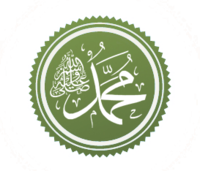Muhammadning shajarasi
Qiyofa
| Islom paygʻambari |
| Muhammad |
|---|
 |
Bu shajara islom paygʻambari Muhammadning qarindoshlari Hoshim va Quraysh qabilasidan boʻlgan „Adnaniy“ oilasi haqidadir[1][2][3][4]. Islom anʼanalariga koʻra, Muhammad kelib chiqishi Ismoilga borib taqaladigan Hoshim qabilasidan kelib chiqqan.
Muhammad paygʻambarning shajarasi
[tahrir | manbasini tahrirlash]
| Kilab ibn Murra | Fotima bintu Saʼd | ||||||||||||||||||||||||||||||||||||||||||||||
| Zuhro ibn Kilab (Banu Zuhroning avlodi) ona tomondan katta bobosi | Qusai ibn Kilab ota tomondan katta bobosi | Hubba bintu Hulayll ota tomondan katta bobosi | |||||||||||||||||||||||||||||||||||||||||||||
| `Abdumannof ibn Zuhro maternal great-grandfather | `Abd Manaf ibn Qusai paternal great-great grandfather | Atikah bint Murrah paternal great-great-grandmother | |||||||||||||||||||||||||||||||||||||||||||||
| Wahb ibn `Abd Manaf maternal grandfather | Hashim ibn 'Abd Manaf (progenitor of Banu Hashim) paternal great-grandfather | Salma bint `Amr paternal great-grandmother | |||||||||||||||||||||||||||||||||||||||||||||
| Fatimah bint `Amr paternal grandmother | `Abdul-Muttalib paternal grandfather | Halah bint Wuhayb paternal step-grandmother | |||||||||||||||||||||||||||||||||||||||||||||
| Aminah mother | `Abdullah father | Az-Zubayr paternal uncle | Harith paternal half-uncle | Hamza paternal half-uncle | |||||||||||||||||||||||||||||||||||||||||||
| Thuwaybah first nurse | Halimah second nurse | Abu Talib paternal uncle | `Abbas paternal half-uncle | Abu Lahab paternal half-uncle | 6 other sons and 6 daughters | ||||||||||||||||||||||||||||||||||||||||||
| Prophet Muhammad | Khadija first wife | `Abd Allah ibn `Abbas paternal cousin | |||||||||||||||||||||||||||||||||||||||||||||
| Fatima daughter | Ali paternal cousin and son-in-law family tree, descendants | Qasim son | `Abd Allah son | ||||||||||||||||||||||||||||||||||||||||||||
| Zaynab daughter | Ruqayya daughter | Uthman second cousin and son-in-law family tree | Umm Kulthum daughter | Zayd adopted son | |||||||||||||||||||||||||||||||||||||||||||
| Ali ibn Zainab grandson | Umamah bint Zainab granddaughter | `Abd Allah ibn Uthman grandson | Rayhana bint Zayd wife (disputed) | Usama ibn Zayd adoptive grandson | |||||||||||||||||||||||||||||||||||||||||||
| Muhsin ibn Ali grandson | Hasan ibn Ali grandson | Husayn ibn Ali grandson family tree | Umm Kulthum bint Ali granddaughter | Zaynab bint Ali granddaughter | Safiyya tenth wife | ||||||||||||||||||||||||||||||||||||||||||
| Abu Bakr father-in-law family tree | Sawda second wife | Umar father-in-law family tree | Umm Salama sixth wife | Juwayriya eighth wife | Maymuna eleventh wife | ||||||||||||||||||||||||||||||||||||||||||
| Aisha third wife Family tree | Zaynab bint Khuzayma fifth wife | Hafsa fourth wife | Zaynab bint Jahsh seventh wife | Umm Habiba ninth wife | Maria al-Qibtiyya twelfth wife-Disputed | ||||||||||||||||||||||||||||||||||||||||||
| Ibrahim son | |||||||||||||||||||||||||||||||||||||||||||||||
- * nikoh tartibi bahsli ekanligini bildiradi
- Eʼtibor bering, toʻgʻridan-toʻgʻri avlod qalin bilan belgilangan.
Manbalar
[tahrir | manbasini tahrirlash]- ↑ Maqsood, Ruqaiyyah Waris „The Prophet's Line Family No 3 – Qusayy, Hubbah, and Banu Nadr to Quraysh“. Ruqaiyyah Waris Maqsood Dawah. 2008-yil 30-mayda asl nusxadan arxivlangan. Qaraldi: 2013-yil 1-iyul.Andoza:Reliable source
- ↑ Ibn Hisham. The Life of the Prophet Muhammad — 181-bet.
- ↑ Parolin, Gianluca P.. Citizenship in the Arab World: Kin, Religion and Nation-State, 2009 — 30-bet. ISBN 978-9089640451. "The ‘arabicised or arabicising Arabs’, on the contrary, are believed to be the descendants of Ishmael through Adnan, but in this case the genealogy does not match the Biblical line exactly. The label ‘arabicised’ is due to the belief that Ishmael spoke Hebrew until he got to Mecca, where he married a Yemeni woman and learnt Arabic. Both genealogical lines go back to Sem, son of Noah, but only Adnanites can claim Abraham as their ascendant, and the lineage of Mohammed, the Seal of Prophets (khatim al-anbiya'), can therefore be traced back to Abraham. Contemporary historiography unveiled the lack of inner coherence of this genealogical system and demonstrated that it finds insufficient matching evidence; the distinction between Qahtanites and Adnanites is even believed to be a product of the Umayyad Age, when the war of factions (al-niza al-hizbi) was raging in the young Islamic Empire."
- ↑ Hughes, Thomas Patrick. A Dictionary of Islam: Being a Cyclopaedia of the Doctrines, Rites, Ceremonies, and Customs, Together With the Technical and Theological Terms, of the Muhammadan Religion. New Delhi: Asian Educational Services, 1995 — 19-bet. ISBN 978-81-206-0672-2. Qaraldi: 2010-yil 24-iyul.
